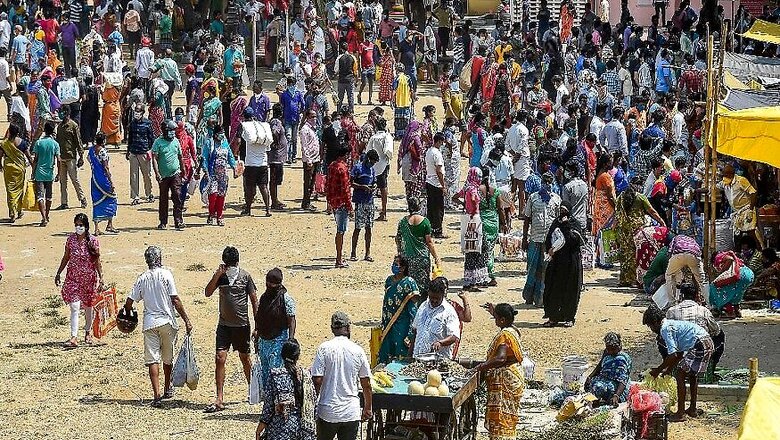
views
The Tamil Nadu administration faced a tough choice as they stared at the possibility of the Koyambedu wholesale market becoming a coronavirus cluster. They could have shut it immediately without waiting to make any alternative arrangement, but that would have choked the supply of vegetables and fruits to the city.
Or they could wait, but the inaction would be equal to juggling a time bomb. The government proved to be indecisive, as no call was taken on the market for a week after talks first started on April 27 on shifting some operators to a different location.
As the days ticked by, the virus eventually had its way and made the decision for the administration. The market was shut on May 4. By then, the market was already a hotspot and had accounted for 300 cases in a single day out of the 527 reported across the state.
The cluster has now forced the state administration to fire all its cylinders in containment action. Still, cases have been on the rise steadily.
Tamil Nadu recorded yet another sharp rise of 580 fresh cases on Thursday as the secondary contacts of those originally infected in the Koyambedu wholesale market cluster turned positive for the Coronavirus. The total cases in Tamil Nadu stand at 5,409 as of Thursday, with 3822 active cases.
“Workers were living in a cramped place there (Koyambedu market). Visitors were not affected much. It was the workers and shop owners who were affected. If that [market access] had been cut off, then the lifeline of essential supplies would have been lost. Anyway, we have traced all the contacts linked to the Koyambedu cluster,” said a senior bureaucrat aware of containment activity in the market.
Chennai continues to remain a worry with 2,281 active cases. Its neighbouring districts like Chengalpattu to its south and Tiruvallur in the north have decidedly remained in the red zone, feeding off the new cluster outbreak from Koyambedu that has reached as far as Cuddalore.
As the struggle to contain the virus continues, the infections have moved to the next layer in the contact network of victims. “It has gone beyond primary contacts. It has now spread to an extent that secondary sources are testing positive - some family members are infecting others. The numbers may increase till the middle of this month and we hope things look better post that,” a senior official privy to the developments said.
The first signs of Koyambedu turning into the cluster had originally emerged in the last week of April. It triggered the city's corporation officials to ramp up testing of loadmen, vegetable vendors and shop owners in the market.
As early as April 27, city corporation officials had expressed doubts if vegetable sellers would agree to proposals to shift a portion of their operations to another location. The city's administration, in fact, held talks with vendors and raised the point that physical distancing was going for a toss in the cramped, tiny shops where wholesaling and retailing of vegetables were selling their wares.
A senior bureaucrat who was part of the meeting with Koyambedu's vendors and shop owners said the wholesalers were willing to move, but it was the retailers who said "their livelihoods would be lost..."
This indicated that there was a back and forth between administrators and the occupants of the Koyambedu market, a negotiation as to what the best course of action will be, all of while the virus was silently spreading its tentacles into the populace.
Another senior bureaucrat directly involved in monitoring the Koyambedu situation said: “From day one, we have been holding discussions with the vendors on shifting the activities elsewhere. They were simply very adamant and hell bent on not moving from the place. Once the numbers increased, we had to shut the place down…”
On their part, officers assert that there was no administrative lacunae, and that the Koyambedu cluster is well on its wane: “The market is shut now. From now on, we will see the curve flattening. Right now, we are concentrating on the new marketplace [Thirumazhisai]...” said an officer involved in the containment process.
On May 1, Tamil Nadu chief Minister Edappadi Palaniswami appointed a crack team led by senior bureaucrat and disaster management expert J Radhakrishnan as the chief nodal officer to control the virus in Chennai. Three days after Palaniswami made the appointment, the Koyambedu wholesale market was closed.
The Koyambedu cluster was not the first in rapid containment for Tamil Nadu. It emerged after the cluster outbreak linked to the Tablighi Jamaat conference. The Koyambedu market cluster is estimated to be nearly five times that of the Nizamuddin cluster in Tamil Nadu.
Senior bureaucrats say, in hindsight, that the Koyambedu cluster has sharpened the conviction that any gathering requires to be closely monitored. For Tamil Nadu, every cluster outbreak containment is proving a costly lesson in crisis management.



















Comments
0 comment